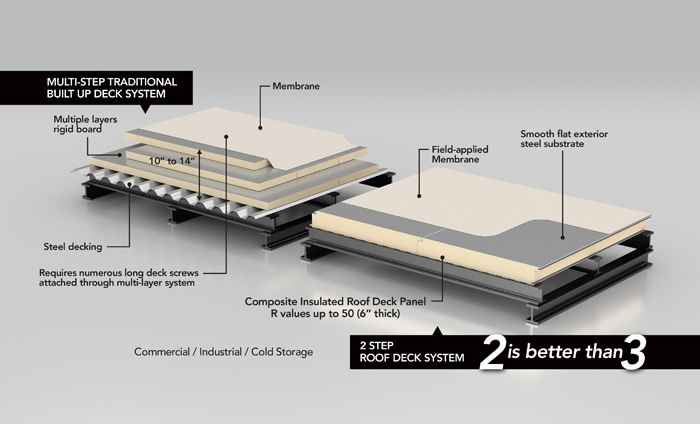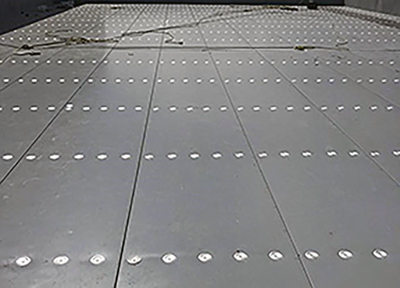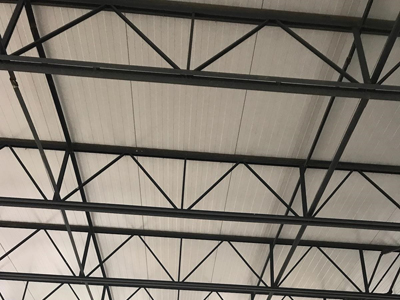Is AWIP's OneDek™ A Game Changer? Product Manager Mark Munley Thinks So
By Ted Johnson, All Weather Insulated Panels
 |
Mark Munley |
Having served positions with Firestone Building Products, Knauf Insulation and Kingspan, Mark Munley has more than three decades in commercial roofing materials expertise. He’s dealt with energy conservation and environmental issues across North
America, the Caribbean and
. He has actively participated on numerous sustainability initiatives within the commercial building sector, participated on LEED Gold and Platinum projects and has developed new service programs and product offerings for national building owners.
Working now as Product Manager for the new OneDek™ roof deck system from All Weather Insulated Panels, Munley sees a revolutionary product. “I consider OneDek™ the most significant development within the commercial roofing space during
my career,” he said.
Munley answered some questions why OneDek™ will be a “game-changer” when it comes to the way large, low-slope buildings will be constructed.
 |
All Weather Insulated Panels' new OneDek™ product is designed specifically for large, low-slope projects. |
 |
The USDA acceptable factory applied-white paint finish on the interior of OneDek™ RD1 panels eliminates post painting, inhibits corrosion and lowers the interior lighting requirement compared to standard galvanized steel.
|
What’s the biggest concern project managers and owners of large flat-roof building projects will have when asked about OneDek™?
MUNLEY: Cost and schedule availability and will the building owner receive a warranty for 20 years – those are top-of-mind influencers. The OneDek™ system is the cost competitive solution that will meet the performance needs of the
design professional while also providing the installation community with an efficient, safe and durable commercial roofing system that will last multiple roof generations.
In Europe, where insulated metal panels (IMPs) are very popular, most there are used in roof applications. In America, more IMPs go into wall projects. Why?
MUNLEY: Since the 1960s, contractors and designers of commercial, industrial and refrigerated buildings have relied on IMPs for their aesthetics, excellent thermal efficiency, ease of installation and overall structural integrity. The use of insulated
panels or roof decks, such as our RD1, represent a natural migration to best management practices. Roof decks can be installed more efficiently, either by a fabricator/erector or by the commercial roofing company. There is no need for
a certified welder.
In your experience, has roof construction been rather slow to evolve to new products?
MUNLEY: Yes. For years, built-up roofing was the dominant system. In the last 40 years we’ve had oil embargoes and labor shortages, both of which threatened supply security of materials and raised costs. Also, improved polymer technology
and manufacturing processes have enabled other waterproofing systems to develop. Today, thermoplastic membranes are the primary single-ply technology used in North America for commercial roofing. As higher R values and wind-uplift requirements are
mandated into code, contractors are looking for more efficient installation techniques.
 |
Installed OneDek, shown from above (above) and below (below). |
 |
What stands out as the chief advantage of OneDek™ compared to traditional flat-roof construction techniques?
MUNLEY: When you evaluate the total installed costs, I believe the advantage is that the system can be installed by any trained trade, in all types of weather conditions. That can mean significant savings for contractors and owners to consider.
Getting the building “dried-in” faster with less consequential damage is a game-changer in terms of construction costs.
Do roof decks meet the newest regulations?
MUNLEY: Our RD1 roof deck has an R value of 8-per-inch and requires significantly less fasteners to achieve ultimate wind-uplift loads of 105 PSF and 165 PSF. We figure that will make contractors and design professionals
more willing to adopt the OneDek™ solution to meet their performance needs. As R Values and higher wind-uplift requirements are regulated into code, the value proposition associated with OneDek™ will become very apparent.
Does OneDek™ offer any benefits not seen on a product data sheet?
MUNLEY: The OneDek™ system offers a continuous insulation solution that is made in a factory-controlled environment and installed in any climatic condition. Phased construction is OK, which can help with scheduling and possibly reduce labor
and equipment costs.
You have seen insurance costs in the roofing industry rise. Does OneDek™ affect this area?
MUNLEY: The RD1 panel has an exterior and interior 22-ga. steel liner which is vapor and water tight. It doesn’t deflect. Also, unlike fiberboard insulation of traditional assemblies, there’s little fear of walking on roof decks. Roof
decks make for a safer, damage-free working platform. However, I believe the greater benefit is that the robust RD1 panel in the OneDek™ system will virtually eliminate callbacks regarding damages by other trades and third parties. Finally,
and it’s the reason why we need roofs, when fully adhered, leaks in the OneDek™ system will be virtually eliminated.
In five years, how prevalent will IMDs be in large, flat-roof projects?
MUNLEY: Early adopters will be very pleased with the installation efficiency and performance associated with the OneDek™ system. The ability to install panels in lengths up to 50 feet will become of great benefit to contractors and owners.
OneDek™ will help them meet tight construction schedules.
For more information on OneDek™ and all AWIP products, please visit the All Weather Insulated Panels website at http://awipanels.com.
Inquiries may be directed to sales@awipanels.com, or please call 888-970 - AWIP (2947).
About All Weather Insulated Panels
 Headquartered in Vacaville, CA, All Weather Insulated Panels (AWIP) is an innovator in the design, construction and advancement of insulated metal wall, roof and deck
solutions. They are strategically positioned to meet the growing energy, environmental and economic challenges facing the North American building industry. For more information, visit www.awipanels.com.
Headquartered in Vacaville, CA, All Weather Insulated Panels (AWIP) is an innovator in the design, construction and advancement of insulated metal wall, roof and deck
solutions. They are strategically positioned to meet the growing energy, environmental and economic challenges facing the North American building industry. For more information, visit www.awipanels.com.




